What are your favorite books about the American West
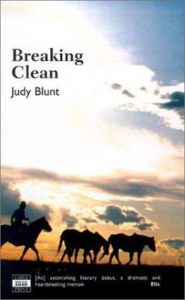 The compelling prose in this memoir about growing up on a northern Montana ranch makes you catch your breath in wonder. In Judy Blunt‘s telling, the landscape and its climate become a living breathing thing, dishing out both beauty and horror in Jekyll-Hyde extremes. Frozen cattle, rescued from the harrowing blizzard of 1964 while barely alive, slowly rot away while giving birth to still-born calves. Ring-necked pheasants “dig their own graves under blankets of snow,” the stronger ones managing to “crack their sealed coffin like an eggshell and burst upward into the jaws of the storm, dropping within seconds, gaping, the air too thick to pull through the slim nares at the top of their beaks.” You’ll be gaping too by the end of this can’t-put-down, white-knuckle chapter. Then there’s doing the work of men while still rustling up supper for hubby and three kids at days end, wondering if there’s a better life in a place where the nearest neighbor isn’t twenty miles away. There’s anger at a female townie friend who doesn’t have a clue about ranch life, and alarm about nearly losing a sick child when unable to get to a doctor on wet, gumbo roads that suck pickup tires into immobility. Yet for all her gritty realism that eventually drives her away from the ranch into a writing career (happily for us), there’s a love of the shortgrass prairie in spring, the wild and domestic animals that graced her childhood, and the family bonds formed in adversity that pull her, and us, into a wistful, if unromanticized, picture of ranch life under Montana’s big sky.
The compelling prose in this memoir about growing up on a northern Montana ranch makes you catch your breath in wonder. In Judy Blunt‘s telling, the landscape and its climate become a living breathing thing, dishing out both beauty and horror in Jekyll-Hyde extremes. Frozen cattle, rescued from the harrowing blizzard of 1964 while barely alive, slowly rot away while giving birth to still-born calves. Ring-necked pheasants “dig their own graves under blankets of snow,” the stronger ones managing to “crack their sealed coffin like an eggshell and burst upward into the jaws of the storm, dropping within seconds, gaping, the air too thick to pull through the slim nares at the top of their beaks.” You’ll be gaping too by the end of this can’t-put-down, white-knuckle chapter. Then there’s doing the work of men while still rustling up supper for hubby and three kids at days end, wondering if there’s a better life in a place where the nearest neighbor isn’t twenty miles away. There’s anger at a female townie friend who doesn’t have a clue about ranch life, and alarm about nearly losing a sick child when unable to get to a doctor on wet, gumbo roads that suck pickup tires into immobility. Yet for all her gritty realism that eventually drives her away from the ranch into a writing career (happily for us), there’s a love of the shortgrass prairie in spring, the wild and domestic animals that graced her childhood, and the family bonds formed in adversity that pull her, and us, into a wistful, if unromanticized, picture of ranch life under Montana’s big sky.
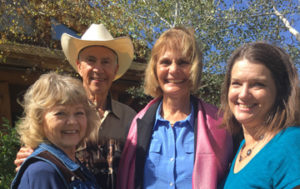
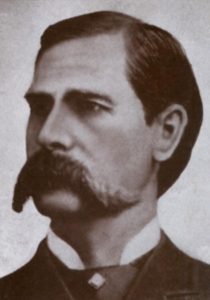
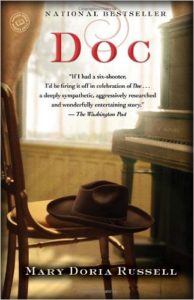 Forget every stereotype you may hold about Doc Holliday and Wyatt Earp. Forget you may not even like “westerns.” Read Doc, the 2011 historical novel by Mary Doria Russell: you’ll be richly rewarded.
Forget every stereotype you may hold about Doc Holliday and Wyatt Earp. Forget you may not even like “westerns.” Read Doc, the 2011 historical novel by Mary Doria Russell: you’ll be richly rewarded.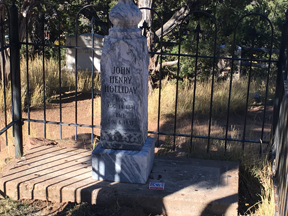
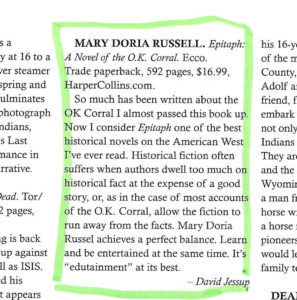


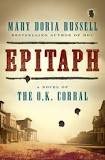 Historical fiction often suffers when authors dwell too much on historical fact at the expense of a good story, or as in the case of most accounts of the OK Corral, allow the fiction to run away from the facts. Mary Doria Russel achieves a perfect balance. Learn and be entertained at the same time. It’s “edutainment” at its best.
Historical fiction often suffers when authors dwell too much on historical fact at the expense of a good story, or as in the case of most accounts of the OK Corral, allow the fiction to run away from the facts. Mary Doria Russel achieves a perfect balance. Learn and be entertained at the same time. It’s “edutainment” at its best.
